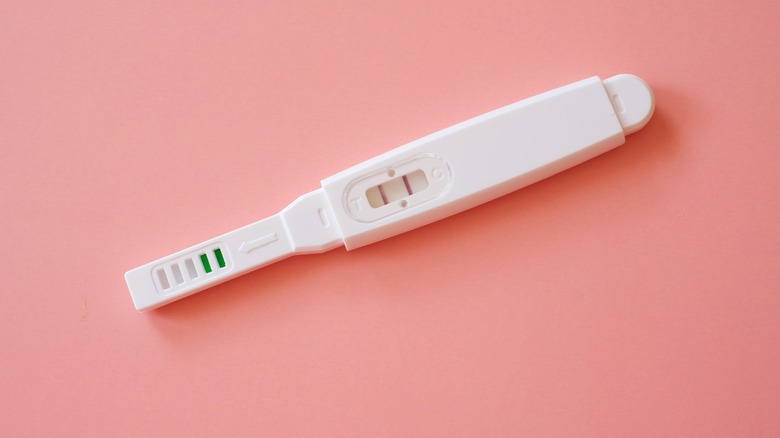Is Spotting Before Your Period A Sign Of Pregnancy?
The crucial difference between a period and spotting is that the latter takes place outside of the normal menstruation window and features a much lighter amount of bleeding, according to Healthline. You'll likely only notice the blood when you wipe after using the bathroom, and in most cases, can get away with a simple panty liner rather than a regular pad or tampon until the bleeding passes. Additionally, while a period lasts a minimum average of four days, spotting will usually have passed after one or two.
Additionally, Medical News Today notes that there are various reasons why you may experience spotting in between periods. One common cause is taking a birth control pill, especially if you've just started it recently. The hormones can lead to spotting until your body has had enough time to adjust. Alternatively, if you notice light bleeding about halfway through your menstrual cycle, you might be able to chalk it up to ovulation, which is when one of your ovaries releases an egg to be fertilized.
This can lead to an increase in cervical mucus and spotting. You may also experience some spotting after sexual intercourse, as the friction can sometimes damage the vaginal tissues, especially when there is a lack of lubrication. It is also possible that spotting before your period is a sign that you are pregnant. Here's what we know.
Pregnancy spotting could be due to implantation bleeding
If you experience spotting but aren't yet due your period, it is definitely possible that you are pregnant, per Medical News Today. This may be a bit confusing since pregnancy is typically known as a time in which menstruation (and all associated bleeding) stops while a fetus grows and develops in the uterus. However, spotting at the very beginning of a pregnancy can be related to the implantation of the embryo. This typically occurs up to a couple of weeks after an egg is fertilized by a sperm and has to do with the embryo attaching itself to the wall of the uterus. In the process, some of the uterine lining may shed and be expelled through the vagina.
WebMD elaborates that implantation bleeding will present with a certain shade to the blood — usually brown or pink, rather than bright red. You may also experience a bit of cramping, but not always. One way you can deduce if the spotting is the result of implantation bleeding is if you also experience other early pregnancy symptoms, such as mood swings, increased urination, swollen breasts, and tiredness.
Since many early pregnancy symptoms mimic pre-menstrual symptoms, you can confirm with an at-home pregnancy test. Certain pregnancy tests are so sensitive nowadays that they can detect pregnancy even before you've missed your period, as the Cleveland Clinic notes. A blood test is even more accurate, and you can speak to your doctor about this option.

